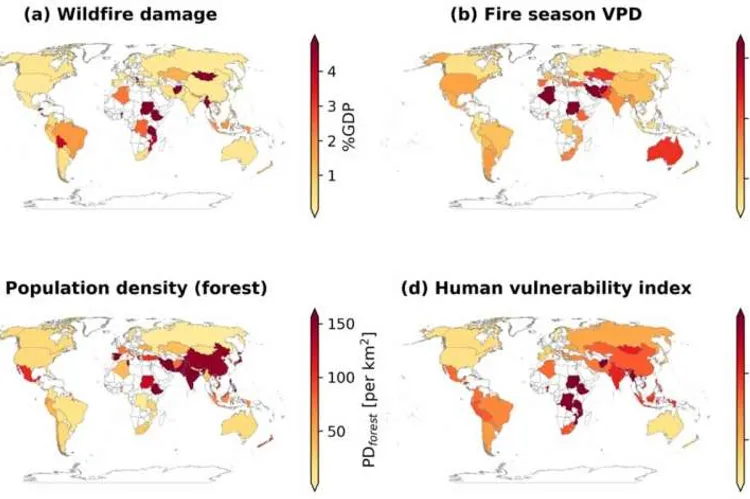July 31, 2025 by Ansa Heyl, International Institute for Applied Systems Analysis edited by Gaby Clark , reviewed by Robert Egan scientific editor associate editor This article has been reviewed according to Science X's editorial process and policies . Editors have highlighted the following attributes while ensuring the content's credibility: fact-checked trusted source proofread Climate-related wildfires are once again making headlines as they rage across the Northern Hemisphere this summer. New IIASA research shows that addressing social and economic vulnerabilities across countries will be a key factor in mitigating the scale of resulting financial damage and emphasizes sustainable development as key to reducing climate-related impacts. Wildfires are a growing global threat, causing widespread destruction to lives, property, and economies. Their impacts are felt across nearly every region of the world, from wealthy nations to low-income countries, with the most severe consequences often falling on those least equipped to recover. As fire seasons lengthen and intensify with our changing climate, the damages from wildfires are expected to increase, straining national budgets, disrupting livelihoods, and deepening existing social and economic inequalities. Led by Yi‐Ling Hwong, a researcher in the Integrated Climate Impacts Research Group of the IIASA Energy, Climate and Environment Program, the authors of the new study published in Environmental Research: Climate looked at wildfire data from 165 countries around the world to uncover why some countries suffer far greater financial damage from wildfires than others. "We wanted to identify the key drivers of economic damages caused by wildfires worldwide and to project how these damages might change in the future under different climate and development scenarios. This is important because, while increasing wildfire frequency and severity are well recognized as impacts of climate change , much less is understood about what determines the resulting financial losses, especially at the global scale," Hwong explains. Using future projections under different climate change and developmental pathways, the team found that by 2070, economic damages from wildfires could be three times higher under a high‐emission scenario than under a pathway focused on sustainable development. The benefits of a more sustainable trajectory are particularly pronounced in the Global South, where avoided wildfire losses could exceed 2% of GDP—more than ten times the benefit seen in high‐income countries. The study’s findings highlight that while climate factors such as heat and drought continue to increase wildfire risks, the level of social and economic vulnerability critically shapes the extent of wildfire-related economic losses. "Most wildfire studies focus on burned areas and consistently identify climate as the main driver. Based on this, we initially expected climate to also be behind most of the wildfire costs. Hence, our finding that socioeconomic conditions also play a crucial role is very interesting. It suggests that we are not powerless in the face of increasing wildfire risks, and that robust adaptation strategies and sustainable development measures play a decisive role in mitigating the economic damages of wildfires," notes co-author Edward Byers, a researcher in the IIASA Energy, Climate and Environment Program. This suggests that strong adaptation measures can reduce the economic costs of wildfires, but only if they are part of a broader sustainable development pathway. If CO2 emissions continue to rise unchecked under a high‐emissions scenario, the worsening climate impacts will eventually overwhelm countries’ ability to adapt. For policymakers, this means that wildfire strategies must go beyond simply fighting fires or reducing emissions to include social investments that improve governance, infrastructure, and equality. Ultimately, the authors want to convey one clear message: reducing the economic toll of wildfires requires both serious climate action and strong, inclusive development. "While the increasing frequency and severity of wildfires driven by climate change are alarming, as recently seen in the devastating wildfires raging across Europe and other parts of the world, our research shows that a country’s social and economic strength can be a decisive factor in determining how badly those fires impact its economy. This means that addressing wildfire risks is not only about fighting fires or controlling emissions. It is fundamentally about building more equitable, stable, and prepared societies," Hwong concludes.
More information: Yi-Ling Hwong et al, Sustainable development key to limiting climate change-driven wildfire damages, Environmental Research: Climate (2025). DOI: 10.1088/2752-5295/adec11 Provided by International Institute for Applied Systems Analysis
























